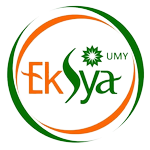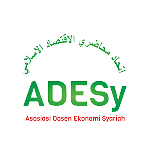Mergers in Sharia Banking and Their Impact on Employee Performance: The Role of Self-Efficacy and Affective Commitment as Moderating
DOI:
https://doi.org/10.18196/jiebr.v3i2.220Keywords:
Organizational Change, Employee Performance, Self Efficacy, Affective CommitmentAbstract
Human resources are one of the main aspects of an organization. Having quality resources can affect the success of an organization. Therefore, companies need to improve employee performance, one of which is by making organizational changes. This study aims to determine the effect of organizational change on employee performance moderated by self-efficacy and affective commitment. This research applied a qualitative method, and the questionnaire data involved 155 respondents from an unlimited total population. The analysis used in this study is the Structural Equation Modelling (SEM) method based on variance, namely Partial Least Square (PLS). The results of the study showed a significant effect between organizational change and employee performance. The affective commitment variable was also able to moderate the effect of organizational change on employee performance, while self-efficacy was not able to moderate the effect of organizational change on employee performance.
References
Adriansyah, A. (2019). Authentic Leadership, Komitmen afektif Dan Job Resourcefullness Dalam Membentuk Kreatifitas Dan Kinerja Pegawai Bank Syariah Di Indonesia. Jurnal Ekonomi, Manajemen dan Perbankan (Journal of Economics, Management and Banking), 5(3), 131–144. https://doi.org/10.35384/jemp.v5i3.155
Alfaris, B., & Zakiy, M. (2021). Affective commitment as a mediation variables effect of empowering leadership on employee creativity. Jurnal Ekonomi dan Bisnis Islam (Journal of Islamic Economics and Business), 7(2), 250. https://doi.org/10.20473/jebis.v7i2.26685
Allen, N. J., & Meyer, J. P. (1990). The measurement and antecedents of affective, continuance and normative commitment to the organization. Journal of Occupational Psychology, 63(1), 1–18. https://doi.org/10.1111/j.2044-8325.1990.tb00506.x
Alola, U. V., Asongu, S., & Alola, A. A. (2019). Linking supervisor incivility with job embeddedness and cynicism: The mediating role of employee self-efficacy. Gadjah Mada International Journal of Business, 21(3), 330–352. https://doi.org/10.22146/gamaijb.39647
Ardi, V. T. P., Astuti, S. E., & Sulistyo, M. C. W. (2017). Pengaruh Self Efficacy Terhadap Employee Engagement Dan Kinerja Karyawan (Studi pada Karyawan PT Telekomunikasi Indonesia Regional V Surabaya). Jurnal Administrasi Bisnis (JAB), 52(1), 163–172.
Bandura, A. (1999). Self-Efficacy: The Exercise of Control. In Journal of Cognitive Psychotherapy, 13(2), 158–166. https://doi.org/10.1891/0889-8391.13.2.158
Boon, Safa, O. K. and, Samaun, M. and A., & Veeri. (2006). TQM Practices And Affective Commitment: A Case Of Malaysian Semiconductor Packaging Organizations - Munich Personal RePEc Archive. International Journal of Management and Entrepreneurship, 1(2), 37–55.
Chamariyah. (2015). Pengaruh Self Efficacy, Assertiveness, dan Self Esteem Terhadap Keinginan Pindah Kerja (Turnover Intentions) Pegawai Pada Bank Jatim Cabang Pamekasan. NeO-Bis, 9(1), 20–38.
Chisaan, A. R., & Zakiy, M. (2020). Employee Stock Ownership As Strategy To Improve Employee Performance ( Case Of Bank Syariah Mandiri Yogyakarta ). JEBIS : Jurnal Ekonomi dan Bisnis Islam, 6(1), 42–59. https://doi.org/10.20473/jebis.v6i1.14873
Dinana, A., & Subiyantoro. (2021). Peran Pengasuh dalam Manajemen Perubahan pada Lingkungan Organisasi Pondok Pesantren Tegalsari di Masa Pandemi Covid-19. Jurnal Pendidikan, 9(2), 56–66. https://doi.org/https://doi.org/10.36232/pendidikan.v9i2.839
Dwianto, A. S. (2017). Penerapan 8 Langkah Perubahan Organisasi Dari Kotter’s Dalam Rangka Mengembangkan Inovasi di PT. Pos Indonesia Untuk Menjaga Eksistensi dan Daya Saing Pelayanan Publik (studi kasus di Kantor Pos Jakarta Utara 14000). Digilib.Mercubuana.Ac.Id, 162.
Fritz, J. H., O’Neil, N. B., Popp, A. M., Williams, C., & Arnett, R. C. (2013). The Influence of Supervisory Behavioral Integrity on Intent to Comply with Organizational Ethical Standards and Organizational Commitment. Journal of Business Ethics, 114(2), 251–263. https://doi.org/10.1007/s10551-012-1345-z
Greenberg, J. (2011). Behavior in Organizations. In Administrative Science Quarterly (10th Editi, Vol 12, Number 2). Pearson Education. https://doi.org/10.2307/2391559
Handriadi, & Ahmad, N. (2020). Pengaruh Kepemimpinan Kepala Madrasah, Efikasi Diri dan Komitmen Profesional Terhadap Motivasi Kerja dan Kinerja Guru MTsN Kota Pariaman. Mau’Izhah : Jurnal Kajian Keislaman, 10(2), 127–142.
Hartmann, L. C., & Bambacas, M. (2000). The International Journal of Organizational Analysis. The International Journal of Organizational Analysis, 8(1), 89–108. https://doi.org/https://doi.org/10.1108/eb028912
Hikmah, A. N. (2020). Pengaruh Reward Dan Efikasi Diri Terhadap Kinerja Dimediasi Variabel Motivasi (Studi Empiris Karyawan Bank Btpn Probolinggo). Jurnal Ilmu Manajemen (JIMMU), 5(2), 188–205. https://doi.org/http://dx.doi.org/10.33474/jimmu.v5i2.8903
Ichsan, R. N., Nasution, L., Sinaga, S., & Marwah, D. (2021). Pengaruh gaya kepemimpinan, perubahan organisasi terhadap kinerja karyawan dengan lingkungan kerja sebagai intervening variabel di PT. Cabang Bank Bumut Binjai. Jurnal Masalah Kontemporer dalam Bisnis dan Pemerintah, 27(2), 258–264. https://doi.org/http://doi.org/10.47750 / cibg.2021.27.02.032
Jakesova, J., Gavora, P., Kalenda, J., & Vavrova, S. (2016). Czech Validation Of The Self-Regulation And Self-Efficacy Questionnaires For Learning. Procedia - Social and Behavioral Sciences, 217, 313–321. https://doi.org/10.1016/j.sbspro.2016.02.092
Karyantini, D. A., & Rochmawati. (2021). Pengaruh Hasil Belajar Micro Teaching dan Lingkungan Keluarga Terhadap Minat Menjadi Guru Akuntansi Melalui Efikasi Diri Sebagai Variabel Moderasi. Jurnal Pendidikan Akuntansi (JPAK), 9(2), 200–209.
Kementerian Keuangan. (2021). Merger Bank Syariah Dorong Pertumbuhan Perbankan Syariah.
Kreitner, R., & Kinicki, A. (2014). Organisational Behaviour, Fifth Edition.
Mangkunegara, A. A. A. P. (2000). Manajemen Sumber Daya Manusia Perusahaan. PT Remaja Rosdakarya.
Mangundjaya, W. L. H. (2016). Psikologi Dalam Perubahan Organisasi. Swasthi Adi Cita.
Meria, L., & Tamzil, F. (2021). Pengaruh Efikasi Diri Terhadap Kesiapan Untuk Berubah Dan Kinerja Karyawan. Forum Ilmiah Indonesia, 18, 279.
Meyer, J. P., & Allen, N. J. (1991). A three-component conceptualization of organizational commitment. Human Resource Management Review, 1(1), 61–89. https://doi.org/10.1016/1053-4822(91)90011-Z
Mudeng, D. S., Tumbel, A., & Taroreh, R. (2017). Pengaruh Perubahan Organisasi Dan Pengembangan Karir Terhadap Kinerja Karyawan Pada KPKNL Manado. Jurnal EMBA: Jurnal Riset Ekonomi, Manajemen, Bisnis dan Akuntansi, 5(2). https://doi.org/10.35794/emba.v5i3.17178
Ozora, N. M., & Taroreh, R. N. (2019). The Influence Of Organizational Changes And Career Development On Employees Performance In PT . Pangansari Utama (PSU) Freeport Project. Jurnal EMBA: Jurnal Riset Ekonomi, Manajemen, Bisnis dan Akuntansi, 7(3), 3688–3697. https://doi.org/DOI: https://doi.org/10.35794/emba.v7i3.24855
Parinding, R. G. (2017). Analisis Pengaruh Komitmen Afektif, Komitmen Berkelanjutan, Dan Komitmen Normatif Terhadap Kinerja Karyawan Pada PT. Pegadaian (Persero) Cabang Ketapang. Magistra Jurnal Ilmu Manajemen, 1(2), 88–107.
Priyono, B. S., Sutomo, Y., Rijanti, T., Farokhi, A. H., & Kuncoro, A. (2018). The Influence of Psychological Capital and Organizational Change to Employee Performance with Organizational Commitment as Moderating Variable. International Journal of Human Resource Studies, 8(4), 84–94. https://doi.org/10.5296/ijhrs.v8i4.13649
Rafferty, A. E., & Griffin, M. A. (2006). Perceptions of organizational change: A stress and coping perspective. Journal of Applied Psychology, 91(5), 1154–1162. https://doi.org/10.1037/0021-9010.91.5.1154
Rafferty, A. E., & Minbashian, A. (2019). Cognitive beliefs and positive emotions about change: Relationships with employee change readiness and change-supportive behaviors. Human Relations, 72(10), 1623–1650. https://doi.org/10.1177/0018726718809154
Rahmawati, S., & Zakiy, M. (2023). POS and Psychological Empowerment as Moderating Variables on the Effect of Job Insecurity on Employee Performance in Islamic Banks. Jurnal Manajemen Teknologi, 22(2), 124–134. https://doi.org/http://dx.doi.org/10.12695/jmt.2023.22.2.1 Copyright@2023.
Robbins, S. P., & Judge, T. A. (2017). Perilaku organisasi Organization Behavior (R. Saraswati & F. Sirait (reds); Edisi 16). Penerbit Salemba Empat.
Ruliana, P. (2016). Komunikasi Organisasi. PT Raja Grafindo Persada.
Sembiring, R., & Winarto. (2020). Pengaruh Budaya Kerja Dan Komitmen Terhadap Kinerja Karyawan (Studi Kasus Pada Perawat Di Rumah Sakit Milik Pemerintah). Jurnal Ilmiah Methonomi, 6(1), 21–30.Sopiah. (2008). Perilaku Organisasi (Edisi pert). Andi Offset.
Sopiyan, P., & Aziz, H. A. (2019). Pengaruh Komitmen Profesi Dan Self-Efficacy Terhadap Konflik Peran. Coopetition : Jurnal Ilmiah Manajemen, 10(1), 15–20. https://doi.org/10.32670/coopetition.v10i1.26
Stevanie, & Mindosa, B. (2019). Dampak Merger & Akuisisi Pada Kinerja Keuangan: Studi Pada Perusahaan Non Keuangan Yang Terdaftar Di Bursa Efek Indonesia Periode 2012-2016. Jurnal Manajemen, 8(2), 182–194.
Sunaryo, S. (2017). Pengaruh Perubahan Organisasi, Budaya Organisasi Dan Perilaku Kerja Terhadap Kinerja Karyawan Di PT. Sisirau Medan. Jurnal Ilmiah Manajemen dan Bisnis, 18(1), 101–114. https://doi.org/10.30596/jimb.v18i1.1101
Tambuwun, C. E., Tewal, B., & Dotulong, L. (2018). Wilayah Viii Manado Effects Of Organizational Change , Organizational Culture And Work Ethic Towards The Employee Performance Of Airport Authority. 6(4), 1938–1947.
Tanjung, R., Arifudin, O., Sofyan, Y., & Hendar. (2020). Pengaruh Penilaian Diri Dan Efikasi Diri Terhadap Kepuasan Kerja Serta Implikasinya Terhadap Kinerja Guru. JIMEA | Jurnal Ilmiah MEA (Manajemen, Ekonomi, dan Akuntansi), 4(1), 380–391. https://doi.org/https://doi.org/10.31955/mea.vol4.iss1.pp380-391
Widjaja, G. (2002). Merger dalam Perspektif Monopoli (1st ed). PT. RajaGrafindo Persada.
Winardi, J. (2008). Manajemen Perubahan (Managemen of Change) (1st ed). Kencana Prenada Media Group.
Yousef, D. A. (2016). Organizational Commitment, Job Satisfaction And Attitudes Toward Organizational Change: A Study In The Local Government. International Journal of Public Administration, 77–88. https://doi.org/10.1080/01900692.2015.1072217
Yuniawan, A., & Udin, U. (2020). The Influence of Knowledge Sharing, Affective Commitment, and Meaningful Work on Employee‘s Performance. International Journal of Economics and Business Administration, 8(3), 72–82. https://doi.org/10.35808/ijeba/487
Zakiy, M. (2019). To Examine Leader-Member Exchange as Moderating Variable on the Influence of Employee Psychological Uncertainty toward Employees’ Job Satisfaction and Turnover Intention. Journal of Leadership in Organizations, 1(1), 29–47. https://doi.org/10.22146/jlo.43770
Zakiy, M., Nur, R., & As, S. (2023). Self-Efficacy as a Moderating Variable The Effect of Organizational Change on Work Stress and Employee Performance in Islamic Banks. FIRM Journal of Management Studies, 8(1). https://doi.org/10.33021/firm.v8i1.4200 Self-Efficacy
Downloads
Published
How to Cite
Issue
Section
License
Copyright (c) 2023 Journal of Islamic Economic and Business Research

This work is licensed under a Creative Commons Attribution-NonCommercial 4.0 International License.
Journal of Islamic Economic and Business Research has CC-BY NC or an equivalent license as the optimal license for the publication, distribution, use, and reuse of scholarly work for non-commercial purpose. The non-commercial use of the article will be governed by the Creative Commons Attribution license as currently displayed on Creative Commons Attribution-NonCommercial 4.0 International License
Creative Commons License




